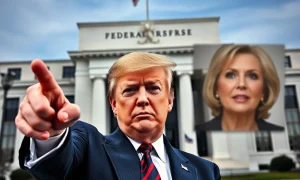The nomination of a new head for the Bureau of Labor Statistics (BLS) often attracts attention. However, the current process has sparked significant debate. Leading economists have sent a harsh message to the White House. Their concerns center on the chosen BLS nominee. This situation underscores the critical role of the BLS. It also highlights the importance of its leader’s independence. Many observers are watching closely. They seek to understand the full implications of this development.
Understanding the Bureau of Labor Statistics and Its Critical Role
The Bureau of Labor Statistics is a principal federal agency. It serves as the primary fact-finding agency for the U.S. government in the broad field of labor economics. This agency collects, processes, analyzes, and disseminates essential statistical data. This data covers various aspects of the U.S. economy. For instance, it provides information on employment, unemployment, wages, and productivity. Furthermore, the BLS produces the Consumer Price Index (CPI). This index measures inflation. It directly impacts everyday Americans.
The BLS maintains a crucial reputation for neutrality and accuracy. Its data forms the backbone of economic policy decisions. Policymakers, businesses, and researchers rely heavily on its impartial reports. Therefore, the integrity of BLS data is paramount. It influences everything from interest rates to social security adjustments. Any perceived compromise to its independence could have far-reaching effects. Consequently, the selection of the BLS nominee carries immense weight.
The Significance of the BLS Nominee
The Director of the Bureau of Labor Statistics holds a pivotal position. This individual oversees the agency’s operations. They also ensure the scientific integrity of its statistical programs. The Director guides research, data collection methods, and reporting standards. Thus, the BLS nominee must possess specific qualifications. These include a strong background in economics, statistics, and public administration. Moreover, they must demonstrate a commitment to objective, non-partisan data reporting. Their leadership impacts how the nation understands its economic health. This influence extends to global markets.
Economists Deliver Stern Warnings Over BLS Nominee
A notable group of economists has voiced significant apprehension. They have sent a clear message to the White House. Their concerns revolve around the proposed BLS nominee. These experts argue that the nominee lacks the necessary qualifications. Furthermore, they cite worries about the nominee’s perceived political leanings. Such criticisms are not common for this position. This makes the current situation particularly striking.
Several prominent economic organizations and individual scholars have contributed to this outcry. They emphasize the need for a director who commands universal respect. This respect must come from both political parties and the academic community. They also stress the importance of a leader who can defend the agency’s independence. The economists’ message is unequivocal. They believe the current choice could undermine public trust in vital economic indicators. This would have serious consequences.
Core Concerns Detailed by Experts
The economists’ objections are multifaceted. They are rooted in specific apprehensions regarding the BLS nominee. Key concerns include:
- Lack of Relevant Experience: Critics argue the nominee does not possess sufficient direct experience in managing a large statistical agency. They also question the nominee’s expertise in labor economics or statistics.
- Perceived Political Leanings: Some economists express worry about the nominee’s past political affiliations or statements. They fear these could compromise the agency’s neutrality.
- Past Statements on Data Methodology: There are concerns about previous remarks made by the nominee. These statements allegedly cast doubt on established statistical methodologies.
- Potential for Politicization of Data: Above all, the fear exists that the agency’s data could become politicized. This would erode its credibility.
These points form the crux of the economists’ harsh message. They seek to protect the BLS’s long-standing reputation. Its independence is crucial for reliable economic analysis.
Potential Ramifications for Economic Policy
The implications of a controversial BLS nominee extend beyond the agency itself. They could significantly impact national economic policy. Trust in economic data is foundational. It guides decisions by the Federal Reserve. It also informs Congressional budgeting. If the public perceives BLS data as biased, these decisions become harder. Markets might react negatively. Investors could lose confidence in U.S. economic reporting. This uncertainty can deter investment. It also creates instability. Therefore, the stakes are incredibly high.
Accurate and unbiased data ensures effective policymaking. For example, inflation data influences interest rate adjustments. Employment figures guide job creation initiatives. Any doubt about these numbers can lead to misinformed policies. This can harm the economy. Moreover, international partners rely on U.S. economic statistics. A weakened BLS could diminish America’s standing as a source of reliable global economic information. This would have wider geopolitical consequences.
Impact on Data Integrity and Public Trust
The integrity of BLS data is non-negotiable. It underpins public confidence in government statistics. A perception of political interference could severely damage this trust. Once trust is lost, it is very difficult to regain. Citizens, businesses, and academic institutions use BLS data daily. They make critical decisions based on it. If they doubt its accuracy, they may seek alternative, less reliable sources. This could lead to fragmented understanding of the economy. It could also fuel misinformation.
Furthermore, the BLS employs dedicated, professional civil servants. They work tirelessly to produce accurate data. A contentious BLS nominee could demoralize these professionals. It might also lead to an exodus of talent. This would further compromise the agency’s capabilities. Protecting data integrity is not merely an academic exercise. It is fundamental to a well-functioning democracy and a stable economy. Therefore, the concerns raised by economists are grave. They demand serious consideration.
The White House’s Perspective and Path Forward
The White House has, predictably, defended its choice for the BLS nominee. Administrations typically stand by their selections. They often highlight the nominee’s strengths and qualifications. The White House might emphasize other aspects of the nominee’s background. For example, they could point to management experience or a commitment to public service. They would likely downplay or refute claims of political bias. Furthermore, they might argue that the nominee is fully capable of leading the agency. This defense aims to reassure stakeholders. It also seeks to garner support for the confirmation process.
The administration must navigate a challenging path. They need to secure Senate confirmation. This requires convincing skeptical lawmakers. It also means addressing the concerns raised by economists. The White House’s strategy will likely involve public statements and private lobbying. They will emphasize the nominee’s dedication to the BLS’s mission. Ultimately, the confirmation process will test the administration’s ability to secure its appointments. It also tests their commitment to independent government agencies.
Navigating the Confirmation Process
The confirmation process for a BLS nominee involves several steps. First, the nomination goes to the Senate. It is then typically referred to a relevant committee. For the BLS Director, this is often the Senate Health, Education, Labor, and Pensions (HELP) Committee. The committee conducts hearings. During these hearings, senators question the nominee. They scrutinize their qualifications, past statements, and vision for the agency. Economists and other experts may also offer testimony. This provides a platform for both support and opposition.
Following the committee vote, the nomination proceeds to the full Senate. A simple majority vote is required for confirmation. This process can become highly politicized. Especially when concerns about an nominee’s independence are significant. The debate will likely highlight the fundamental importance of the BLS. It will also underscore the delicate balance between political appointments and agency autonomy. The outcome will shape the future of labor statistics. It will also impact public confidence in federal data.
The economists’ harsh message to the White House regarding the BLS nominee reflects deep concern. They prioritize the integrity and independence of the Bureau of Labor Statistics. The BLS provides essential data. This data informs critical economic decisions. Therefore, its leadership must be above reproach. The ongoing debate highlights the vital importance of this often-overlooked agency. It also emphasizes the need for a director who can maintain its non-partisan standing. The nation awaits the outcome of this significant nomination. Its implications will resonate across economic policy and public trust for years to come.
Frequently Asked Questions (FAQs)
What is the Bureau of Labor Statistics (BLS)?
The Bureau of Labor Statistics is the principal fact-finding agency for the U.S. government in labor economics. It collects and analyzes data on employment, unemployment, wages, productivity, and inflation, including the Consumer Price Index (CPI).
Why is the BLS nominee so important?
The BLS nominee, as Director, oversees the agency’s operations and ensures the scientific integrity of its statistical programs. Their leadership is crucial for maintaining the impartiality and accuracy of economic data, which policymakers and the public rely on.
What are economists’ main concerns about the current BLS nominee?
Economists have raised concerns regarding the nominee’s perceived lack of direct experience in statistical agency management, potential political leanings, and past statements that might undermine trust in established data methodologies. They fear a compromise of the agency’s independence.
How could a controversial BLS nominee affect economic policy?
A controversial BLS nominee could erode public and market trust in economic data. This could lead to misinformed policy decisions by the Federal Reserve and Congress, potentially causing market instability and hindering effective economic management.
What is the process for confirming a BLS nominee?
The President nominates the candidate, who then faces a hearing before a relevant Senate committee, typically the HELP Committee. If approved by the committee, the nomination proceeds to a full Senate vote, requiring a simple majority for confirmation.
Why is data integrity at the BLS so critical?
Data integrity at the BLS is critical because its unbiased statistics form the basis for major economic decisions, from interest rates to social security adjustments. Any perceived political interference or inaccuracy can severely damage public trust and undermine the credibility of U.S. economic reporting.








